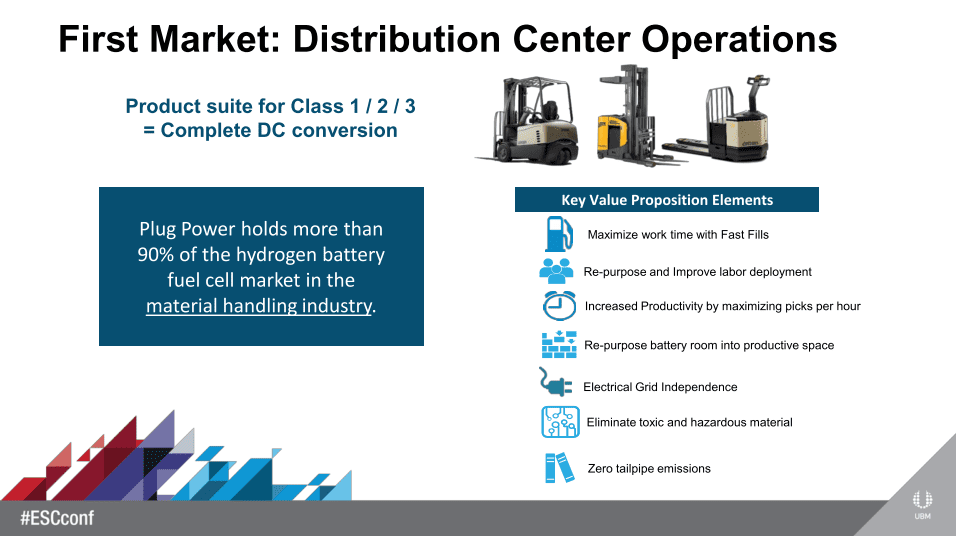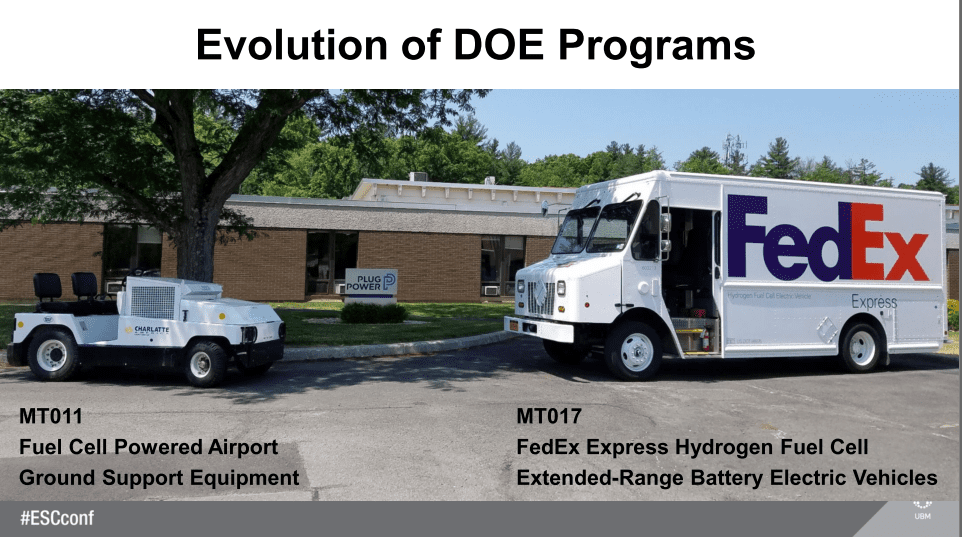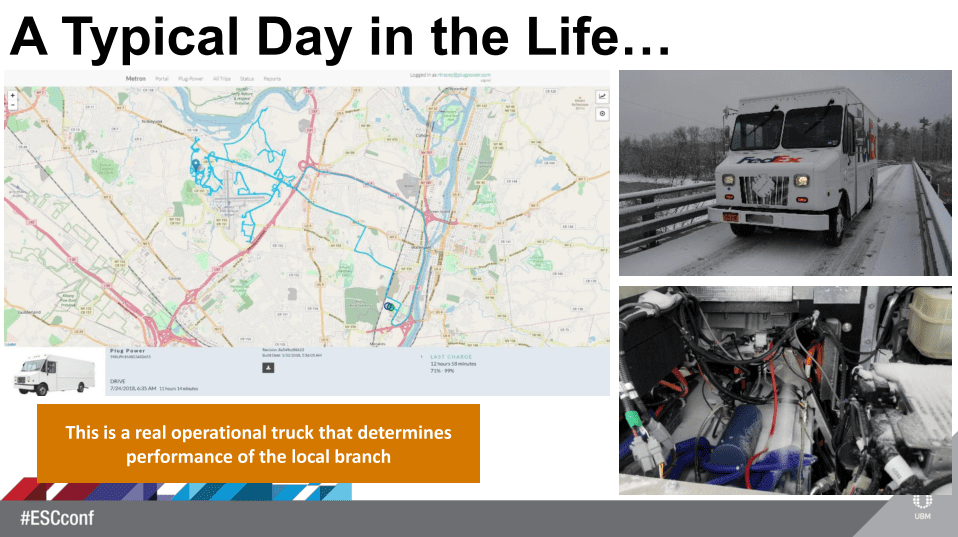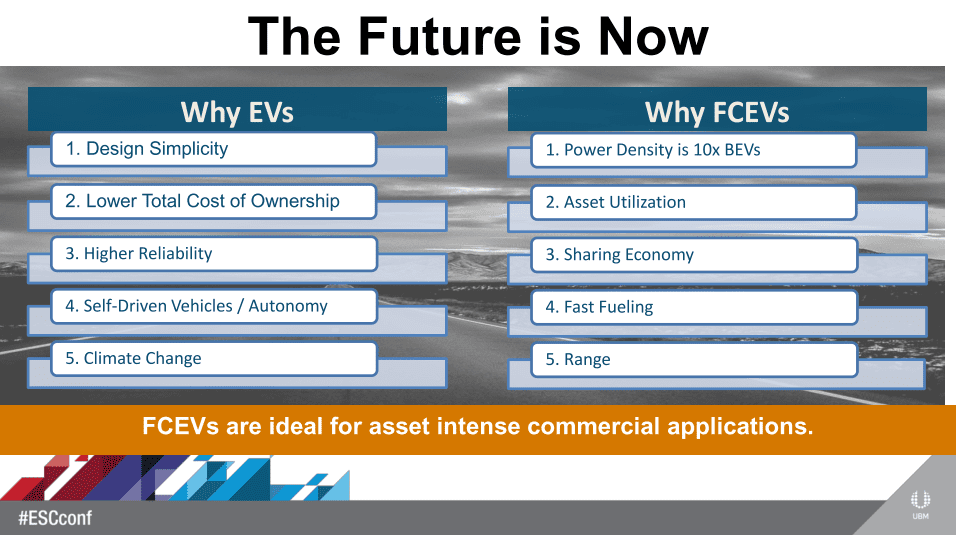Plug Power at The Battery Show
Tags: FCEV, fcv, fuel cell electric vehicles, fuel cell vehicles, the battery show
Electric vehicles are moving their closer to center stage due to their simple design, low cost, high power density and efficiency. This is in part thanks to the production and popularity of consumer facing battery-powered electric vehicles such Tesla’s Model 3 and fuel cell-powered electric vehicles like the Toyota Mirai and Hyundai Nexo. The increase of consumer interest and adoption is worth noting as it validates the demand for cleaner mobile solutions as well as encourages further innovation, and ultimately adoption.
A report from the Department of Energy (DOE) anticipates that by 2040, fuel cell electric vehicles (FCVs) will be a less expensive option for the majority of light duty vehicles than battery electric engines. And, according to the Hydrogen Council, hydrogen and fuel cells are a critical component to the decarbonization of the transportation sector. As the cleanest power solution, FCV adoption is accelerating – FCVs replaced BEVs as this years #1 key trend until 2025. But getting there means we don’t wait until 2040 or even 2025 to start. We work at it consistently, building the hydrogen economy from all points on the compass. At Plug Power, we started years ago in the material handling space, commercializing forklift fuel cells. Now, we’re using our hard-won experience to expand into on-road markets with our ProGen engine – currently powering a FedEx delivery van. Recently, Plug Power spoke at The Battery Show about hydrogen fuel cells and the way forward in an electrified world.
Defining the Technology
- What is a BEV?
- A battery electric vehicle (BEV), or all-electric vehicle is a type of electric vehicle that uses chemical energy stored in rechargeable battery packs. BEVs use electric motors and motor controllers instead of internal combustion engines for propulsion.
- What is an FCV?
- A fuel cell electric vehicle (FCV) is a type of electric vehicle which uses a fuel cell, instead of a battery, or in combination with a battery or supercapacitor, to power its on-board electric motor.
Plug Power developed the FCV market for the material handling sector, currently owning more than 90% of the market for forklift fuel cells. Our customers span market segments including food storage and distribution, manufacturing and ecommerce, including such notable companies as Walmart, Amazon, BMW, Bridgestone and Carrefour. We continue to work hard in the industrial mobility market, supporting our customers’ success through improved productivity and sustainability.
At the same time, we’re taking the knowledge we have developed in industrial mobility out of distribution centers and putting it on the road. We’re working with government and industry partners including the DOE, FedEx, Charlatte America, and Workhorse to develop, test and commercialize vehicles for airport ground support and neighborhood package delivery.
Our first ProGen-powered delivery van has been delivering packages in the Albany, NY area for the past several months and has accumulated more than 8,500 on-road miles through snow storms, summer rains and blistering heat and now continues into fall and winter conditions. Once all 20 trucks planned for this program are on the road, FedEx anticipates that over less than 2 years, the program will reduce diesel consumption by 100,000 gallons and CO2 emissions by 270 metric tons, while expanding vehicle range by up to 160% over battery-powered vans.
We’re not saying there’s not a place for BEVs on the road today and in the future. Far from it. We believe that electric vehicles offer a simpler design, higher reliability, and a sustainable solution that contributes to improving climate change issues. We are saying that FCVs are especially ideal for applications with high-asset utilization, such as fleet vehicles that increase in value the more they operate.
Ultimately, whether the future of electric vehicles is powered solely by batteries, a battery/fuel cell hybrid or fuel cells alone, it’s going to take a multitude of technology to meet the varying demands of short range consumer cars, highly-utilized fleet vehicles (self-driven or otherwise), airport and seaport ground support equipment, to name a few. It’s going to be an amazing future and Plug Power is driving toward it.
#InfiniteDrive



